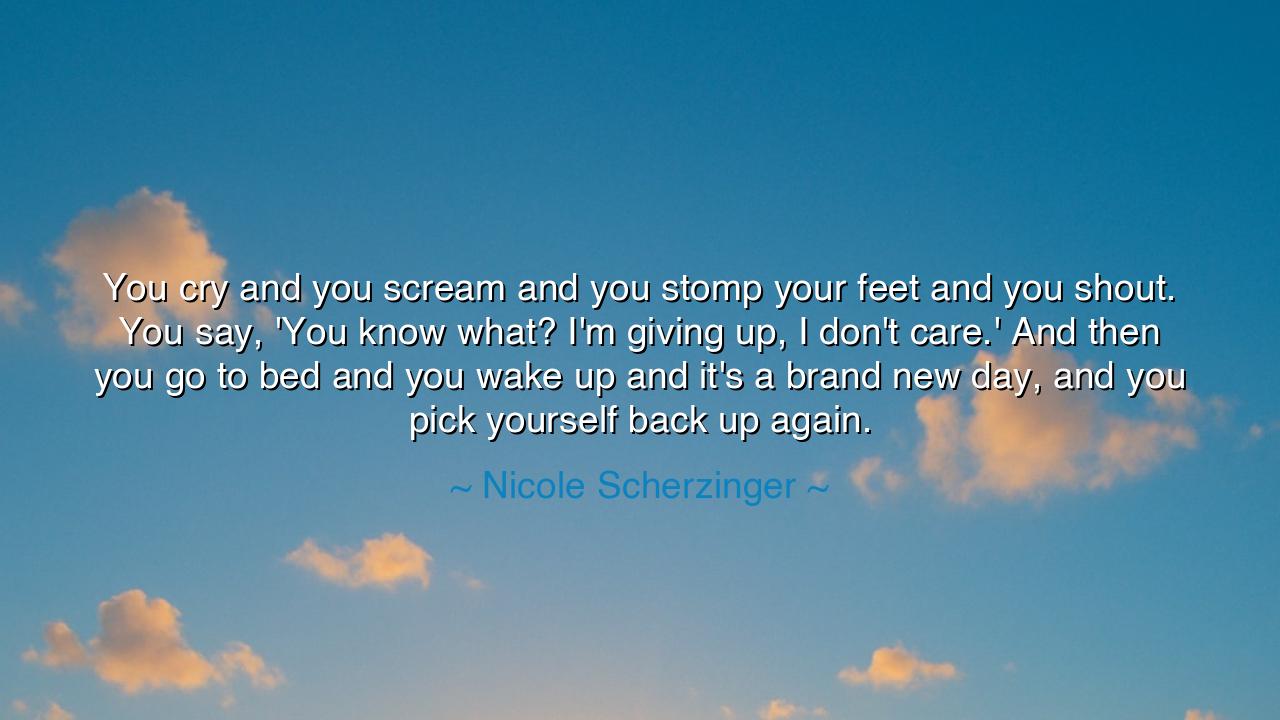
You cry and you scream and you stomp your feet and you shout.
You cry and you scream and you stomp your feet and you shout. You say, 'You know what? I'm giving up, I don't care.' And then you go to bed and you wake up and it's a brand new day, and you pick yourself back up again.






Nicole Scherzinger, a voice both tender and fierce, once confessed this truth of the human heart: “You cry and you scream and you stomp your feet and you shout. You say, ‘You know what? I’m giving up, I don’t care.’ And then you go to bed and you wake up and it’s a brand new day, and you pick yourself back up again.” These words speak not merely of frustration, but of the eternal rhythm of despair and renewal, of the night that breaks into dawn, of the spirit that falters but refuses to die.
For in the course of life, there are moments when the weight is too great, when the soul erupts in anger, tears, and hopelessness. To cry, to scream, to stomp your feet—these are the signs not of weakness, but of humanity. They are the body and heart releasing what cannot be contained. Even the strongest among us reach this breaking point, and in such moments it seems the only option is surrender. Yet Scherzinger reminds us of an ancient truth: surrender is never final. The night may swallow us, but the morning restores us.
The ancients themselves knew this cycle. In the Psalms, it is written: “Weeping may endure for a night, but joy cometh in the morning.” And so it has been throughout history. Consider Winston Churchill in the darkest days of World War II. He wept in private, he raged against fate, he confessed at times that the burden was unbearable. Yet every morning, he rose again, stood before his people, and declared that Britain would never surrender. His tears did not make him weak; they purified his resolve, and his rising after despair gave him strength to lead.
Scherzinger’s words remind us that the new day is a gift greater than we often realize. The sun’s rising is not only an event of the sky but also of the soul. Sleep resets the body, and time heals the spirit. What felt unbearable at midnight is often bearable at dawn. The problem may remain, but the heart awakens with a renewed chance to face it. Thus, each day is a resurrection, a chance to begin again, to gather courage once more.
There is also wisdom in admitting defeat, even temporarily. To say “I’m giving up, I don’t care” is sometimes necessary, for in those words we release the impossible burden of perfection. We step back, we rest, we collapse into the safety of night. But as Scherzinger teaches, true defeat does not live there. Rest is not surrender—it is preparation. And when the morning comes, we find within ourselves a spark that still burns, small but alive, urging us to stand again.
The lesson for us is clear: you are not measured by the nights you cry, but by the mornings you rise. Let yourself feel the anger, the grief, the exhaustion—it is natural, it is human. But never let those feelings define you. Always trust that the brand new day will bring with it the strength to try again. Endurance is not the absence of despair, but the refusal to let despair be the final word.
Therefore, take this teaching into your life: when the weight grows too heavy, allow yourself to break, to grieve, to shout into the night. But also promise yourself that when the sun rises, you will rise with it. Begin again, even if it is only with small steps. For the true mark of courage is not never falling—it is falling, and then finding the will to stand once more.
And so, let it be passed down as wisdom: despair may rule the night, but hope always claims the morning. Cry if you must, collapse if you must, but when dawn comes, rise again—for each sunrise is a reminder that life itself has not given up on you.






AAdministratorAdministrator
Welcome, honored guests. Please leave a comment, we will respond soon